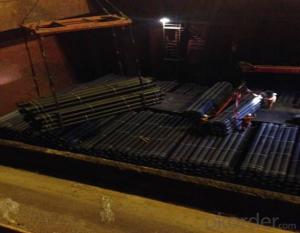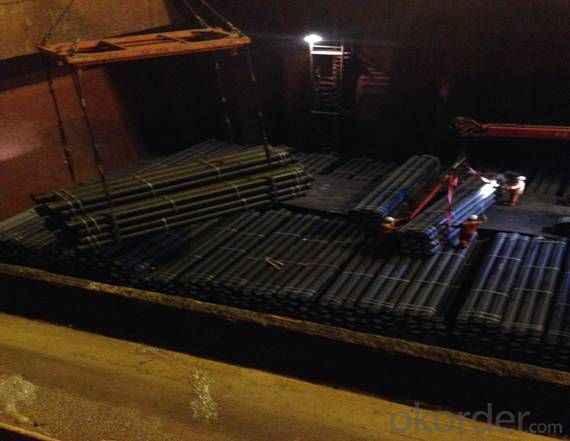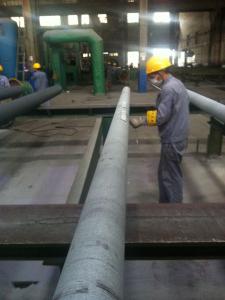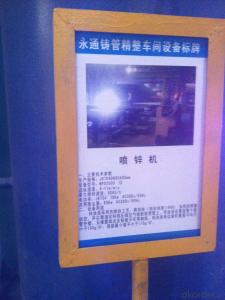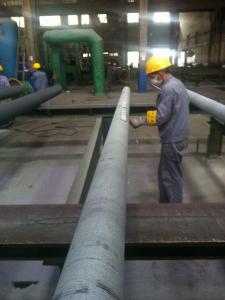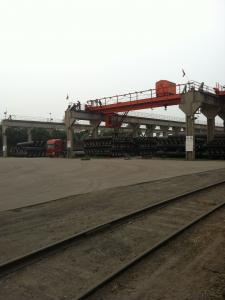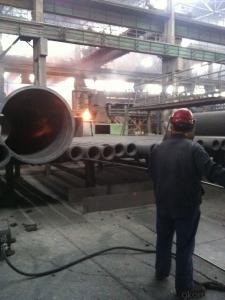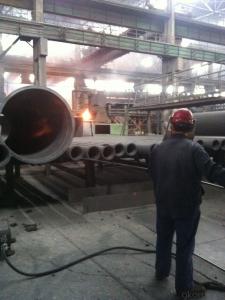DUCTILE IRON PIPES AND PIPE FITTINGS K9 CLASS DN1700
- Loading Port:
- Tianjin
- Payment Terms:
- TT OR LC
- Min Order Qty:
- 22 pc
- Supply Capability:
- 3000 pc/month
OKorder Service Pledge
OKorder Financial Service
You Might Also Like
Material : Ductile Cast Iron
Size Range : DN 80mm to DN 2000mm
Unit Effective Length : 6m or 5.7m
Manufacture Standard: ISO 2531:1998/ EN 545:2006/EN 598:2007
Annual capacity : 200,000 tons
Coating Exterior: Zinc 130g/m2 according to ISO 8179-1 and bitumen coating 70 microns.
Cement Interior: Portland Cement/ High Alumina Cement/ Sulphate Resisting Cement Lining according to ISO 4179
Special requirements on external coating and internal lining can be applied
We also provide accessories such as SBR/EPDM rubber gaskets, lubricant paste, pipe caps, PE sleeves, etc.
Additional Parts:
Each pipe is strictly inspected according to related standard to ensure permanently high performance.
Easy Installation at site and service free for life
Long Service Lifespan
Quotation will arrive you within 24hours once we get your inquiry.
We guarantee offering you a competitive price.
A copy of original inspection reports of pipes will be offered after shipment.
Photos of loading process will be sent to the customer after shipment effect.
We will follow-up the delivery progress after shipment effect and update to the customer on weekly basis.
- Q: Can ductile iron pipes be used for underwater installations?
- Yes, ductile iron pipes can be used for underwater installations. Ductile iron is a strong and durable material that is resistant to corrosion, making it suitable for submerged applications. Additionally, ductile iron pipes have excellent joint integrity, ensuring water-tightness even under high hydrostatic pressure. The pipes are often coated with protective linings and coatings to further enhance their resistance to corrosion and extend their lifespan in underwater environments. Overall, ductile iron pipes are a reliable choice for underwater installations due to their strength, durability, and corrosion resistance properties.
- Q: Are there any special coatings or linings used for ductile iron pipes?
- Ductile iron pipes utilize specialized coatings and linings to protect against corrosion and increase their lifespan. The interior and exterior surfaces of the pipes are treated with these coatings and linings. Several popular options for ductile iron pipes include cement mortar lining, polyethylene encasement, fusion bonded epoxy (FBE) coating, and polyurethane lining. Cement mortar lining is frequently employed to create a safeguarding layer on the inside of ductile iron pipes. This mixture of cement, sand, and water is applied to the pipe's interior surface. By doing so, it effectively prevents corrosion caused by water or other fluids flowing through the pipes. Polyethylene encasement is an additional protective coating used for ductile iron pipes. This method involves enveloping the pipes with a layer of polyethylene material. This barrier protects against environmental factors and inhibits direct contact between the pipe and the surrounding soil, minimizing the risk of corrosion. Fusion bonded epoxy (FBE) coating is a thermosetting epoxy powder coating that is administered to the exterior of ductile iron pipes. This coating provides exceptional corrosion resistance and mechanical protection. FBE coating is often utilized in aggressive environments where pipes are exposed to chemicals or high moisture conditions. Polyurethane lining is another type of lining employed for ductile iron pipes. It offers superior resistance to both corrosion and abrasion. This liquid polymer lining is sprayed onto the interior surface of the pipes, resulting in a smooth and durable protective layer that extends the life of the pipes. These coatings and linings are essential for maintaining the integrity and longevity of ductile iron pipes, ensuring optimal performance in a variety of applications such as water distribution, wastewater management, and industrial processes.
- Q: What is the expected external coating for ductile iron pipes?
- The expected external coating for ductile iron pipes is typically a protective layer that is applied to the exterior surface of the pipe to prevent corrosion and extend its lifespan. Some common types of external coatings for ductile iron pipes include polyethylene, polyurethane, and epoxy coatings. These coatings provide a barrier between the pipe and the surrounding environment, preventing the pipe from coming into contact with corrosive substances such as soil, water, and chemicals. The choice of coating depends on factors such as the intended application, soil conditions, and the level of corrosion protection required. Overall, the expected external coating for ductile iron pipes is designed to ensure the longevity and durability of the pipes in various environmental conditions.
- Q: Can ductile iron pipe be used for irrigation pumping stations?
- Yes, ductile iron pipe can be used for irrigation pumping stations. Ductile iron pipe is known for its durability, corrosion resistance, and ability to withstand high pressure and flow rates. It is a commonly used material for water supply systems, including irrigation pumping stations, due to its reliability and long service life.
- Q: Can ductile iron pipes be used for underground storage tanks?
- Under specific circumstances, ductile iron pipes are appropriate for underground storage tanks. This material possesses strength and durability, effectively resisting corrosion and making it a suitable option for underground applications. Nevertheless, several factors must be taken into account before implementing ductile iron pipes for underground storage tanks. First and foremost, it is vital to evaluate the project's precise demands and regulations. Different regions and industries may enforce specific guidelines regarding the materials used in underground storage tanks. It is imperative to ascertain that ductile iron pipes comply with these regulations and meet the required standards for underground storage. Secondly, the size and capacity of the storage tank must be considered. Ductile iron pipes are available in various sizes, but their dimensions may not be suitable for large-scale storage tanks due to limitations. Consulting engineers or experts is necessary to determine the appropriate pipe size and capacity for the specific storage requirements. Lastly, the design and installation of the underground storage tank necessitate careful planning. Adequate measures should be taken to seal and protect against external factors such as soil movements, water pressure, or other potential hazards. Preventive actions should be implemented to avoid leaks or damage to the pipes, ensuring the safety and longevity of the storage tank. In conclusion, ductile iron pipes can be utilized for underground storage tanks, but it is crucial to consider the specific requirements, regulations, sizing limitations, and proper design and installation. Seeking guidance from professionals in the field and adhering to industry standards will ensure successful implementation of ductile iron pipes for underground storage tanks.
- Q: What are the typical maintenance requirements for ductile iron pipe?
- The typical maintenance requirements for ductile iron pipe involve regular inspection, cleaning, and repair. Inspection is a crucial aspect of maintaining ductile iron pipe and should be conducted periodically to identify any signs of damage, corrosion, or leaks. This can be done through visual inspection, as well as the use of non-destructive testing techniques like ultrasonic or magnetic particle testing. Regular inspections help in detecting and addressing any issues before they escalate and cause significant damage. Cleaning is another important maintenance requirement for ductile iron pipe. Over time, sediment, scale, and other debris can accumulate inside the pipe, reducing its flow capacity and potentially causing blockages. Regular cleaning using methods like high-pressure water jetting or mechanical cleaning can help remove these deposits, ensuring optimal flow and preventing any issues related to reduced water flow or pressure. Repairing any damage or corrosion is an essential maintenance requirement for ductile iron pipe. If any cracks, leaks, or other forms of damage are detected during the inspection, prompt repair is necessary to prevent further deterioration and potential failure. Depending on the extent of the damage, repairs can include methods like welding, epoxy lining, or even replacement of the affected section of the pipe. In addition to these specific maintenance requirements, it is also important to implement a comprehensive maintenance program that includes preventative measures. This may involve measures like cathodic protection, which helps prevent corrosion, or the application of protective coatings to extend the lifespan of the pipe. Overall, regular inspection, cleaning, and repair are the typical maintenance requirements for ductile iron pipe. Adhering to these maintenance practices ensures the longevity, reliability, and optimal performance of the pipe system, minimizing the risk of failures and disruptions.
- Q: How are ductile iron pipes protected against external damage?
- Various protective measures are employed to shield ductile iron pipes from external damage. One commonly used method entails applying a protective coating to the pipe's outer surface. This coating acts as a barrier, preventing direct contact between the pipe and corrosive elements in the surrounding environment. Materials like epoxy, polyurethane, or zinc, which exhibit excellent resistance against corrosion, abrasion, and chemical attacks, can be utilized for this purpose. Furthermore, an additional layer of protection can be provided by encasing ductile iron pipes in a concrete or cement mortar lining. This lining not only reduces the likelihood of physical damage caused by external impacts or soil movement but also enhances the pipe's hydraulic performance by minimizing friction and maintaining a smooth flow of fluids. In addition, proper bedding and backfilling techniques are employed during the installation of ductile iron pipes. This involves using appropriate materials such as sand or gravel to support and stabilize the pipe, thereby minimizing the risk of external damage resulting from uneven ground settlement or heavy loads. Compacting the backfill material adequately is vital to ensure the long-term integrity and stability of the pipe. Regular inspection and maintenance are also crucial for safeguarding ductile iron pipes against external damage. Routine inspections can identify any signs of corrosion, coating deterioration, or physical harm, enabling timely repairs or replacement before significant issues arise. Additionally, employing proper cathodic protection systems can counteract electrochemical reactions occurring on the pipe's surface, preventing corrosion by applying an electric current. To summarize, the protection of ductile iron pipes against external damage encompasses the application of protective coatings, concrete or cement mortar linings, appropriate bedding and backfilling techniques, and regular inspections and maintenance. These measures collectively ensure the durability, longevity, and dependable performance of ductile iron pipes in various environments and applications.
- Q: Can ductile iron pipes be used in areas with high levels of heavy metal contamination?
- Ductile iron pipes can indeed be used in areas with high levels of heavy metal contamination. Ductile iron is a strong and durable material that is resistant to corrosion, making it suitable for various environmental conditions, including areas with heavy metal contamination. The high levels of heavy metals in the surrounding soil or water do not affect the structural integrity or performance of ductile iron pipes. These pipes have a protective lining, usually made of cement mortar or polyethylene, which acts as a barrier between the pipe and the surrounding environment. This lining prevents the heavy metals from leaching into the water flowing through the pipes. Furthermore, ductile iron pipes have been proven to be highly resistant to chemical corrosion, including the corrosion caused by heavy metals. They have been extensively used in industrial applications where heavy metal contamination is common, such as wastewater treatment plants, industrial facilities, and mining sites. However, it is important to note that while ductile iron pipes can withstand high levels of heavy metal contamination, regular monitoring and maintenance are still necessary. This ensures that the protective lining remains intact and any potential issues are addressed promptly. In summary, ductile iron pipes are a suitable choice for areas with high levels of heavy metal contamination. Their strength, durability, and resistance to corrosion make them reliable for transporting water and other fluids, even in challenging environments.
- Q: Advantages and disadvantages of ductile iron pipes
- Generally not used in high pressure pipe network (6MPa or more). Because the pipe is relatively bulky, the machine must be used when installing. When the water leak occurs after the test, all the pipes must be dug out, and the pipe can be hoisted to the height of the clamps. The clamps can be installed to prevent leakage.
- Q: What is the typical lifespan of ductile iron pipes?
- The typical lifespan of ductile iron pipes can range from 75 to 100 years, depending on various factors such as the quality of the installation, maintenance practices, and the conditions in which the pipes are exposed to.
Send your message to us
DUCTILE IRON PIPES AND PIPE FITTINGS K9 CLASS DN1700
- Loading Port:
- Tianjin
- Payment Terms:
- TT OR LC
- Min Order Qty:
- 22 pc
- Supply Capability:
- 3000 pc/month
OKorder Service Pledge
OKorder Financial Service
Similar products
Hot products
Hot Searches
Related keywords
